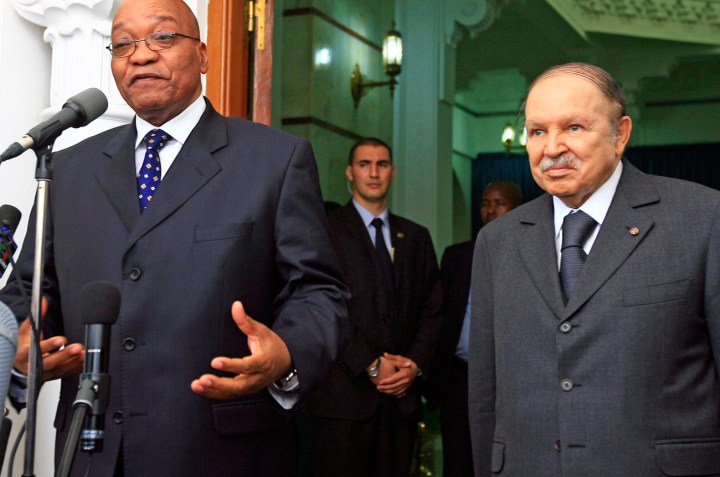Africa
Analysis: Like South Africa, Algeria dances an awkward dance on Libya

Algeria has taken a frustratingly neutral stance on the war in Libya. Without explicitly supporting Gaddafi, they have also refrained from cheering on the rebels as the de facto government of Libya. With striking similarities to South Africa, Algeria has refused to cave to international pressure, preferring instead to offer lame platitudes of neutrality. But when Gaddafi’s posse was confirmed to be in Algeria earlier this week, questions began to surface about the true loyalty of the Algiers government. Could Gaddafi’s next-door neighbours really be his saving grace? By KHADIJA PATEL.
Algeria remains the only one of Libya’s neighbours yet to recognise the National Transitional Council (NTC) as the de facto government of Libya. Even Russia was roused to recognise the NTC as legitimate representatives of Libya early on Thursday, just in time for Friends of Libya conference in Paris. The spoils of the war are already being distributed, but Algeria has refused to comment on the foibles of their neighbours, except to condemn Nato for intervening while insisting on neutrality for what they deem a domestic tiff.
Puzzled political analysts have questioned if Algeria’s lack of commitment for a firmer stance on Libya was in fact a tacit expression of support for Gaddafi. Yet, the Gaddafi regime and the Algerians have not always been on the best of terms. So deeply does the antagonism between Libya and Algeria lie that the two countries have often been poised to draw arms against each other. And while relations between the neighbours have certainly improved in recent times, Gaddafi has never been a friend of Algeria. Yet Algeria has not allowed its chequered history with the Colonel influence its position as he is wrested away from power.
On Thursday Algeria announced that it would indeed recognise a new government of Libya, but that government could not be the TNC in its current form. For Algeria to acknowledge a new government has risen to power in Libya, that government must be fully representative of Libya’s tribal and geographical make-up. Algerian Foreign Minister Mourad Medelci said in an interview with French broadcaster Europe 1 on Thursday that “The National Transition Council has announced that it will soon be forming a government representative of all the regions of the country and once it does this we will recognise it”. The Algerian stance on Libya is then remarkably to similar to the South African one.
Like South Africa, Algeria has chosen to remain neutral on events in Libya, insisting that the will of the Libyan people must come to be. Privately however, high ranking members of the ruling party, the National Liberation Front (FLN), have been quoted in Algerian media supporting Gaddafi. So too, South Africa has insisted that as “a matter of principle”, the country does not meddle in the internal squabbles of another sovereign state – yet anecdotal evidence suggests many envelopes bearing the Gaddafi insignia has made its way through the corridors of Luthuli House. Representatives of South Africa’s Department of International Relations and Co-Operation (Dirco) have emphasised that South Africa does not believe in unilateralism, preferring instead the crowds of a multilateral approach to conflict resolution. So too, Algeria.
Algeria however was one of just two countries, along with Syria, to vote against the Arab League resolution that called on the United Nations to impose a no-fly zone over Libya earlier this year, criticising policies of armed intervention. South Africa conversely, voted for the resolution but then criticised Nato for the manner in which the no-fly zone was implemented. These similarities are not coincidental. Algeria has banked on the African Union (AU) to resolve the fracas in Libya. This is an Algeria abandoning allegiances to the Arab league and clubbing together instead with the (AU). Algeria has however severely underestimated the sway of the gulf states over the Arabic states in North Africa. It is only with the approbation of the likes of Qatar that the Nato intervention in Libya has succeeded. In the groundswell of support for the TNC, Algeria, along with South Africa, has been criticised for not throwing their lot with the rebels. An expression of neutrality has been interpreted as a covert expression of support for Gaddafi.
When the Algerian ambassador to the United Nations Mourad Benmehidi on Monday announced that Gaddafi’s wife, Safia, his daughter, Aisha, and sons Hannibal and Mohamed had arrived in Algeria with their families, Algeria’s professed neutrality appeared especially incongruous. Algeria granted entrance to the family on “humanitarian grounds”. Algeria is now in contravention of the UN Security Council Resolution 1970, passed on 26 February, that prohibits members of Gaddafi’s family from travelling out of Libya. The ban includes the names of all three of Gaddafi’s children who are now in Algeria because of their “closeness of association with (the) regime”. The UN ban requires “all member states” to prevent Gaddafi’s family and other government officials from entering their territories, unless there is some special circumstance that the council agrees warrants an exception. The resolution also allows the nation – in this case, Algeria – to determine “on a case-by-case basis that such entry or transit is required to advance peace and stability (and) notifies the committee within 48 hours after making such a determination”. UN Secretary General Ban Ki-moon was notified early on Monday of the arrival of the Gaddafis, granting Algiers a reprieve on notifying the international community. News of the Gadddafi family arrival in Algeria was of course followed by news that Aisha had given birth there a day later – explaining perhaps the humanitarian grounds on which Algeria allowed the family into the country.
Speculation, however, has grown that Gaddafi himself would choose to escape to Algeria. Reports on Thursday indicate that the Colonel has in fact sought refuge in Algeria but has been pointedly ignored. Quoting a source close to the Algerian presidency, Algeria’s El Watan reported on its website: “Gaddafi tried to reach President Bouteflika by phone but he refused to take the call. A presidential adviser excused him saying he was absent and busy with events in Algeria”. The Algerian government source also puts the location of Gaddafi on the Libyan-Algerian border town of Ghadamis. Gaddafi himself is clearly not welcome in Algeria. Again echoing a South African position of confidence that Gaddafi would not seek asylum in South Africa, the Algerian Foreign Minister also revealed on Thursday that the Algerian government was confident Gaddafi would not be welcome there. “There was never a question and never did we consider the idea that one day Mr Gaddafi could come knocking at our door,” he said. It could well be that both South Africa and Algeria, with such statements, are sending subliminal messages to Gaddafi, politely asking him to knock on some other country’s door.
Late on Thursday Algeria announced that it had closed its border with Libya, scuppering any plans Gaddafi may have had to commandeer his way through. As soon as the uprising in Libya began, Algeria began bolstering its border, fearing unruly elements from Libya may try to make their way through. For Algeria, Gaddafi is not a primary concern. Instead it is its own domestic security and the safety of its government from subversive threats that remains a paramount concern. While Algeria has accepted an overture from the NTC, preparing the road for a formal recognition of a future Libyan government, Algerian officials claim “Islamist militants” have infiltrated the NTC and al-Qaeda’s North African wing will exploit the chaos in Libya to acquire weapons and explosives.
After the fog of transition clears, the South African stance on Libya may be applauded for its principle, but the Algerian stance is implicitly born not of principle but of a fixation with self-preservation. Algerian leaders know well that Algiers could well be the next scene in the Arab uprising. DM
Read more:
- A First Take on Algeria & Libya in The Moor Next Door.
Photo: REUTERS


















 Become an Insider
Become an Insider